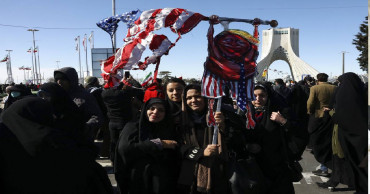environmental activists
Farmers, environmental activists hold demos in The Hague
Thousands of farmers and other anti-establishment demonstrators protested Saturday in a park in The Hague against Dutch government plans to reduce nitrate emissions, while elsewhere in the city climate activists angry at what they call state support for the fossil fuel industry broke through police lines to block a major road.
The simultaneous demonstrations — a few kilometers (miles) from one another — come days before Dutch voters go to the polls in provincial elections Wednesday that indirectly also elect the national parliament’s upper house and could have an effect on proposals for reducing nitrate pollution.
Police said they stopped an unknown number of tractors that were headed for the farmers' demonstration. The municipality banned all but two “symbolic” tractors from participating, citing safety concerns.
As thousands of people, many carrying the upside-down Dutch flags that have become synonymous with farmers' protests and balloons emblazoned with the logo of the far-right Forum for Democracy party, gathered peacefully in front of a stage for the demonstration, the two permitted tractors drove slowly across the park.
Earlier, Rotterdam broadcaster Rijnmond showed video of a convoy of tractors crossing the city’s Erasmus Bridge early Saturday, apparently on their way to The Hague. One of the tractors was emblazoned with a banner saying in Dutch “#proudofthefarmer.”
As the farmers were gathering in a park in the south of the city, Mayor Jan van Zanen gave police permission to use a water cannon on Extinction Rebellion protesters who blocked a major highway in the downtown area near where it runs past the temporary home of the Dutch parliament.
Police said demonstrators who refuse to leave the road would be detained. The highway was blocked in both directions, but police did not immediately use the water cannon.
The twin demonstrations prompted authorities to place army trucks near some crossroads ready to block the streets if tractors or other protest vehicles tried to drive into the city center.
Anger at moves to cut nitrate emissions have spread from the Netherlands to other European nations. Just over a week ago, farmers drove hundreds of tractors into the heart of the Belgian capital, Brussels, snarling traffic.
At protests in recent years, farmers have driven hundreds of tractors into the center of The Hague and also used them to blockade supermarket warehouses.
The government has said that nitrate emissions, which are produced by livestock, transport and industry, must be drastically reduced close to nature areas that are part of a network of protected habitats for endangered plants and wildlife stretching across the 27-nation European Union.
The coalition wants to cut emissions of pollutants, predominantly nitrates, by 50% nationwide by 2030. Ministers call the proposal an “unavoidable transition” that aims to improve air, land and water quality, and have warned that it will mean "that not all farmers can continue their business.”
2 years ago
200 environmental activists killed globally in 2021: Report
Some 200 environmental and land defense activists were killed around the world in 2021, including some 54 in Mexico, which assumed the position of the deadliest country in the annual report by nongovernmental organization Global Witness.
More than three-quarters of the killings took place in Latin America, where Colombia, Brazil and Nicaragua also logged double-digit death tolls.
It was the third consecutive year of increases for Mexico and a jump from 30 such activists killed in 2020.
“Most of these crimes happen in places that are far away from power and are inflicted on those with, in many ways, the least amount of power,” the report said.
Global Witness considers its report a baseline, noting “Our data on killings is likely to be an underestimate, given that many murders go unreported, particularly in rural areas and in particular countries.”
The victims died fighting resource exploitation and in land disputes. Conflicts over mining were tied to 27 deaths worldwide, the most for any sector.
Fifteen of those mining-related killings were in Mexico.
In the western Mexico state of Jalisco, José Santos Isaac Chávez was killed in April 2021. He was running for local office and had made opposition to a long-running mine a central part of his campaign. Days before the election, he was found dead in his car, which had been driven off a cliff and his body showed evidence of torture. Armed men had dragged him out of his home and driven him away in his own vehicle.
In April 2021, Sandra Liliana Peña Chocué, an Indigenous governor in southwest Colombia, who had fought for the eradication of coca crops in Caldono, Cauca was killed near her home by armed men. Her murder was condemned by the United Nations, nongovernmental organizations and foreign governments.
Overall, killings of environmental activists in Colombia dropped in 2021 to 33 from 65 the year before. The Philippines saw fewer such killings in 2021 too, 19 compared to 30 in 2020.
In the Democratic Republic of Congo, all eight recorded victims were killed inside Virunga National Park.
In November, conservation park ranger Chief Brigadier Etienne Mutazimiza Kanyaruchinya, 48, was killed when 100 heavily armed men, presumed to be former members of the M23 rebel group, attacked a patrol post near the village of Bukima in Congo’s North Kivu Province.
Virunga Park is home to some of the world’s last mountain gorillas, but armed groups such as the Democratic Forces for the Liberation of Rwanda, known by its French acronym FDLR, the Mai-Mai and the M23 regularly vie for control of eastern Congo’s natural resources.
Global Witness called on governments to enforce laws that protect activists and require informed consent from Indigenous groups, while also requiring companies to be accountable throughout their global operations and have zero tolerance for attacks on land defenders.
“Activists and communities play a crucial role as a first line of defense against ecological collapse, as well as being frontrunners in the campaign to prevent it,” Global Witness CEO Mike Davis said in the report.
3 years ago
Iran sentences alleged US spies to up to 10 years in prison
Iran sentenced eight environmental activists, including an Iranian who reportedly also has British and American citizenship, to prison sentences ranging from four to 10 years on charges of spying for the United States and acting against Iran's national security, the judiciary said Tuesday.
5 years ago





